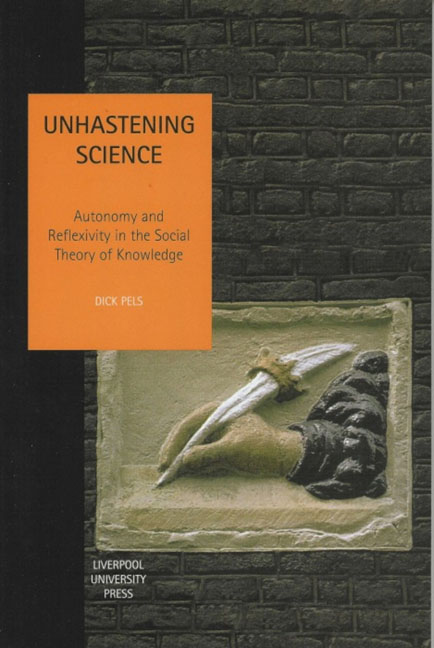Book contents
- Frontmatter
- Dedication
- Contents
- Acknowledgments
- 1 The Timescape of Science
- 2 What (Again) is So Special about Science?
- 3 Two Traditions in the Social Theory of Knowledge
- 4 The Natural Proximity of Facts and Values
- 5 Knowledge Politics and Anti-Politics: Bourdieu on Science and Intellectuals
- 6 The Politics of Symmetry
- 7 Reflexivity: One Step Up
- 8 Intellectual Autonomy and the Politics of Slow Motion
- Epilogue: Weak Social Theory
- Notes
- Bibliography
- Index
7 - Reflexivity: One Step Up
- Frontmatter
- Dedication
- Contents
- Acknowledgments
- 1 The Timescape of Science
- 2 What (Again) is So Special about Science?
- 3 Two Traditions in the Social Theory of Knowledge
- 4 The Natural Proximity of Facts and Values
- 5 Knowledge Politics and Anti-Politics: Bourdieu on Science and Intellectuals
- 6 The Politics of Symmetry
- 7 Reflexivity: One Step Up
- 8 Intellectual Autonomy and the Politics of Slow Motion
- Epilogue: Weak Social Theory
- Notes
- Bibliography
- Index
Summary
And therefore in reasoning, a man must take heed of words; which besides the signification of what we imagine of their nature, have a signification also of the nature, disposition, and interest of the speaker.
Thomas Hobbes, LeviathanThe Romance of Reflexivity
Ever since Socrates turned the logical thumbscrews on his opponents and fancifully called it ‘dialogue’, the injunction ‘Know thyself’ has exercised an enduring moral fascination on generation after generation of thinkers. Educated in such Socratic dialogues (and by Delphic oracles), many have also come to savour the insight, famously argued but also involuntarily exemplified by Auguste Comte, that the science that comes closest to our own existential concerns is the most intricate and difficult of all. For Kant, who first championed the idea of reflexive philosophical judgment, the quest for self-knowledge was nevertheless equal to a descent into hell – an insight that found abundant corroboration in the heroic but also painful posturing of Nietzsche, who descended to psychological depths where no Kantian would ever dare enter. In Nietzsche's informed judgment, every great philosophy, including the Kantian system, was actually ‘a confession on the part of its author and a kind of involuntary and unconscious memoir’ (1990 [1886]: 37). Perhaps it was for this reason that Foucault chose to resist this form of truthfulness: ‘Don't ask who I am’ (2002: 19).
As few others, Foucault remained wary of the many pitfalls and seductions that escort all calls for reflexive self-disclosure. Reflexivity often parades itself in a show of confessional virtues, such as the courage of ‘opening up’, the candour of ‘telling where you come from’, the correctness of ‘taking responsibility for your roots’, and the consistency of ‘not making an exception of yourself’. Reflexive sociology, whether in the autobiographical and personalistic style practised by Gouldner in the 1970s or in the more rigorously impersonal and objectifying version advocated by Bourdieu during the 1980s, typically flourishes such a rhetoric of moral rectitude and epistemological panache. Ethnomethodology has been censored for its ‘skew to the right’ in its failure to sustain a radical referential reflexivity (Pollner 1991). As the previous chapter has described, rival schools in the constructivist studies of science, each trying to be more self-consciously reflexive than the others, have routinely accused one another of committing the ‘self-excepting fallacy’ and of a ‘failure of nerve’ in facing the consequences of this radical methodical principle.
- Type
- Chapter
- Information
- Unhastening ScienceAutonomy and Reflexivity in the Social theory of Knowledge, pp. 157 - 178Publisher: Liverpool University PressPrint publication year: 2003



